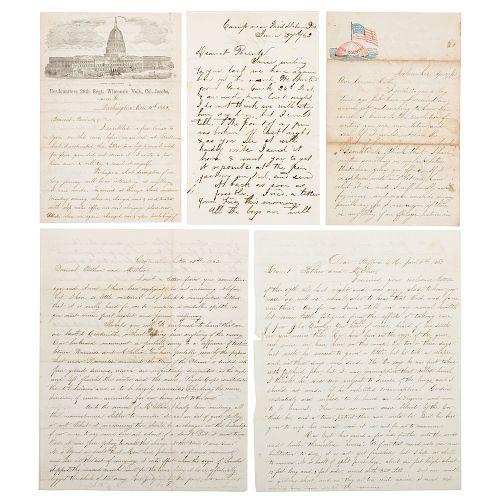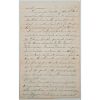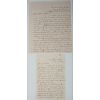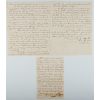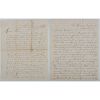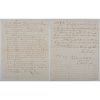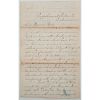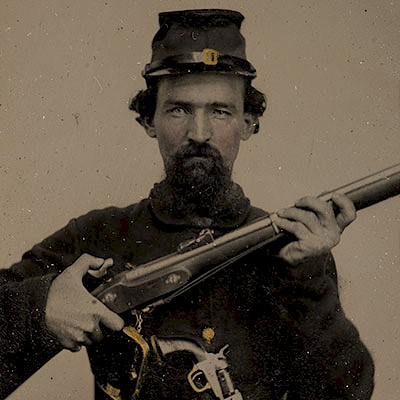Civil War Archive of George W. Jones, 26th Wisconsin Infantry
About Seller
6270 Este Ave.
Cincinnati , OH 45232
United States
With offices in Cincinnati, Cleveland and Denver, Cowan’s holds over 40 auctions each year, with annual sales exceeding $16M. We reach buyers around the globe, and take pride in our reputation for integrity, customer service and great results. A full-service house, Cowan’s Auctions specializes in Am...Read more
Two ways to bid:
- Leave a max absentee bid and the platform will bid on your behalf up to your maximum bid during the live auction.
- Bid live during the auction and your bids will be submitted real-time to the auctioneer.
Bid Increments
| Price | Bid Increment |
|---|---|
| $0 | $25 |
| $500 | $50 |
| $1,000 | $100 |
| $2,000 | $250 |
| $5,000 | $500 |
| $10,000 | $1,000 |
| $20,000 | $2,500 |
| $50,000 | $5,000 |
| $100,000 | $10,000 |
About Auction
Jun 21, 2019
On June 21, Cowan’s Auctions will be offering a remarkable selection of historic photography, letters, documents, flags, political ephemera, and more representing the Revolutionary War-period through the Civil War, Indian Wars, and beyond, as well as the American West. Cowan's Auctions dawnie@cowans.com
- Lot Description
Lot of approx. 96 letters, plus several partial letters.
The 26th Wisconsin Volunteer Infantry was formed at Milwaukee in the late summer of 1862. Almost 90% of its members were Germans, other than Co. G. The regiment mustered into Federal service September 17 and left for Washington the first week of October. Initially it was attached to the Army of the Potomac (2nd Brig., 3rd Div., 11th AC), then transferred to the Army of the Cumberland in October 1863.
George William Jones (born August 6, 1843) enlisted in August, as soon as he obtained his mother's consent. A handful of pre-war letters are included in the archive. One is dated April 16th 1861: " The telegraphic news from the south is that the rebels have taken fort Sumpter [sic] & Major Anderson killed or prisoners of war. The National Government are making arrangements to retake the fort. " Fortunately, not all of the rumors were true. The rebels did take the fort, but allowed the Federal troops to leave. Arrangements to retake the fort did not get underway until late summer of 1863, and then failed. (It was evacuated ahead of Sherman's march through South Carolina.) About a week later he mentions a rumor that Washington was taken by the rebels, but he believes (correctly) that to be false.
In a letter to his cousin Ruth, (Milwaukee, April 27, 1861), he notes that he is attending Lincoln's Commercial College in Milwaukee. “ I have not enlisted yet, but it would take but very little urging to make me. It is hard to decide between duty to my Country and duty to my parents. As long as I think My country has enough without me I shall stay at home, but when I think my services are really needed in defense of her flag, I shall hesitate no longer, but cheerfully enroll my name among those who are willing to exert themselves in order to destroy that Hydra headed Monster – Southern Treason .”
Jones wrote to his cousin again from Camp Sigel (training) just after they mustered in in September: “ I am exceedingly sorry to hear of your affliction in losing your brother. I too know what it is to have affliction; never did I suffer such agony of heart as I did for a few days before my enlistment, as I could not obtain my mothers consent to go. I felt as if a mountain was lifted from my heart when that consent was at length gained, and I could have leaped for joy had it not been for my mothers grief. I shall always look to that one act as the greatest sacrifice for my wishes that a loving mother could make, and as long as I have a tongue to bless my mother need never repent having let me go... ”
He wrote to his parents, also, while training at Camp Sigel: [September 7, 1862] “ I embrace the first opportunity of writing to you since I left home….Considering all things both present & future I never was better satisfied with any act of my life than that of enlisting…. ” [September 12] “ I have been detailed to fill out the muster roll of the company…We have very comfortable quarters here but not such fare as we had at home of course and those that expected it are deceived ."
He made it a point to write often, especially since his mother was hesitant to let him enlist. He tried to ease her worries at every opportunity.
[September 17, 1862] " …Some few of the boys are dissatisfied on account of being in a german Regt. But I think a man can serve his country as well in this division as in any other & if this is the cause for which they enlist, they ought not to be dissatisfied as long as they are decently treated ."
" The news from the war is quite encouraging the last day or two McLellan has defeated Lee & routed his army, with but small loss on our side… To my mind there is not the least doubt of the result of the contest if the freemen of the north will but listen to the mandate of reason and cease wrangling among themselves about the superiority of this or that General ."
“ I presume you have seen the letter from the Chippewa chiefs to the President, offering to fight the Sioux, provided the government will equip them. That shows how much ground there was for the great ‘Indian scare.’ ”
[On the cars 36 miles from Baltimore October 9, 1862] To his parents: " We have had quite a tiresome but still a pleasant ride with no accident except some of the boys losing their caps! I do not propose? [to] give you a full description of our journey now but will do so as soon as we get stationed...."
" I have seen no troops as yet, though it is said there are 40 thousand at Har_____ay the suburbs of which we passed through. They are drafting in Ohio. In Cleveland the draft in the last ward was made last Monday. The president & cashier of one of the banks were among the number drawn ."
" Rosecranz has met the rebels at Corinth & completely routed them ."
[Arlington Heights October 14, 1862] Again to his Cousin he writes: “ We left Milwaukee a week ago last Monday & arrived in Washington last Friday night. We were crammed pretty closely in the barracks with the floor for a bed...While at Baltimore I visited one of the hospitals & saw several of our wounded Wis. Boys, but none that I knew. They are taken the best of care of & the poor fellows seem to be cheerful & happy. Baltimore has a strange appearance to me as it is built almost entirely of red brick & this bears quite a contrast to the cream colored brick of Milwaukee. "
[Camp near Fairfax C.H. October 24, 1862] To his parents: “ Last Monday we were reviewed by Genl. Sigel and Staff. …the country through here is decidedly desolate & everywhere we see the devastating effects of an invading army. …The soil is a stiff red clay; it does not look as if it would raise white beans. The timber is chiefly black oak, red cedar & scrub pine. …We are about 40 miles from any considerable number of the enemy. From indications I think we shall move to Centreville 9 miles from here before long, but perhaps I am mistaken .”
They became more involved in the Peninsular Campaign. [Thorough Fare Gap November 4, 1862] " …Last Sunday morning we started in heavy marching order from Fairfax. We walked some 15 miles and camped for the night near Bull Run. Yesterday we marched about 15 more…To day I have seen some of the political working of the army maneuver called Foraging. To a looker on it would seem 'something like' stealing. This morning the boys rallied out in quest of whatever they would find. They commenced by taking a few sour apples from a neighboring orchard, they soon however went into the door yard and proceeded to confiscate chickens, ducks, geese &c. from this they proceeded to the fields & there put in force the foraging order by driving & killing sheep (fat) cattle calves horses &c. Co. G. has some 9 sheep with chickens ducks &c. ad infinitum. One of the coolest incidents that I noticed was that of a N.Y. Vol. who after catching a horse, politely requested a saddle of the man. On being told that there was not one on the premises he proceeded to search the house giving his word that he would touch nothing else. Whether he found one or not I do not know. The 'Lady of the house' told me that the owner was a secesh in principle but that he had never given aid or comfort to the rebels! She said she had numerous friends & relations in the northern army. ….I could not help but pity them, rebels though they are. They were a fair specimen of the poor whites of the south. They lived in a small house in one corner of the plantation, & raised corn enough to live on & that is about all. This was but one of the families out of several that were so served today. …it looks hard, but I suppose it is the logical effects of war… "
[Centreville November 22, 1862] " Perhaps you will be surprised to learn that we are back to Centreville without having seen anything of the enemy. Our backward movement is probably owing to a difference of tactics between Burnside and McLellan. You have probably seen by the papers that under Burnside’s command the Army of the Potomac is divided into four grand divisions, which are respectively designated as the right and left flanks, the center and the reserve. Sigels Corps constitutes the 4th division and is to be largely increased. This being the reserve division of course accounts for our being sent to the rear. ”
He goes on to note that he does not yet know whether McClellan’s removal is a good thing or not. “ …I am now getting quite at home in camp, and I stand the fatigues of the march and bivouac better than I expected, yet I must confess that the 'sacred soil of Virginia' is rather a poor substitute for a feather bed!"
“ Centreville is a lonesome and desolate looking place. War has done its work effectively in this vicinity & there is scarce a thing to be seen but bears marks of the destroyer’s hand. There are but few houses left standing scarcely enough for the head quarters of our Generals. There are several forts built on the heights and a line of breastworks running nearly around the 'village,' constructed by the Secesh. ”
[Centreville December 5, 1862] He writes to his parents as a snowstorm is keeping most indoors. They had recently returned to Centreville and set up their winter quarters. “ It was not a retreat because we could not hold the place but because it was of no advantage to Burnsides Army in the advance. The Rail Road passing through Gainesville which was of such use to the Govt. while the troops were at Warrenton, became useless when the base of operations was changed to the Rappahannock as the supplies were then sent down the Potomac…thence by rail to the army. Consequently we fell back to Centerville, Fairfax and vicinity where we could be more cheaply supported. The idea that Jackson is preparing for an attack on Washington with 40 thousand troops is decidedly ridiculous. It is but a short time since the Rebels ignominiously failed to take it with upwards of 150 thousand men…"
“ …Those hard crackers of which I formerly entertained such hard ideas are not so bad as I anticipated – when soaked in coffee they are wholesome and nutritious – for a change I like them as well as bread… ”
The winter months did not provide as much battle fodder as the warmer months. In the winter letters he tends to spend more effort relating news about other Wisconsin boys, the camp conditions, etc. [In camp near Stafford C.H. January 9, 1863] “ In regard to our food we now fare better than when we first came here, as Burnsides army in the advance then took a great deal of the supplies that belonged to us. We now have pretty regularly, beans, rice and a few dried apples, with beef and pork. Our indefadigable [sic] old cook the other day got us up an amalgamation soup composed as nearly as I can recollect of the following articles – pork cut up fine, beans, rice, dried apples, potatoes, and onions. In this we soaked our crackers, and with a pint cup for a soup dish we were fully prepared to appease the cravings of Hunger …"
“ Our camp is not in a very pretty place, but it is comfortable, being shut in from the wind, by a hill on one side and woods on the other. ”
Then came the spring rains. [In Camp near the Stafford C.H. February 8, 1863] “ …The 3rd & 4th it froze hard and about midnight on the 4th we recd. Orders to march the next morning at 8 o/clock. Accordingly at that hour amidst a glorious snow storm we were on the move. The ground was frozen hard & for a while the walking was pretty good. We made about 5 miles that day & went into camp for the night. About dusk it began to rain and continued to drizzle all night & all the next day. The next morning the roads presented an enticing appearance for marching They were ankle deep in a mixture of a clay & rainwater reduced to the thickness of cream. We paddled through this for about 8 miles, when we arrived here….I tell you I say 10 span of Artillery horses hitched to one caisson besides 15 or 20 men at the wheels & then while I was in sight all their efforts to extricate it from the mud were in vain .”
A month later: [Camp near Stafford, C.H. March 1863] “ ...I am still devoid of any thing in the line of news to write you. We are still living in the same Va. ranch - … & located on the plot to which we have the supreme right and title of “Squatter Sovereigns.” How much longer we shall be permitted to enjoy this right in this particular locality I cannot say. It depends chiefly on how soon the mud dries up so as to make it within the limits of possibility to move…"
" This division has a great deal of duty to do in the line of picketing and fatigue…. The Fatigue duty is chiefly to build corduroy roads, at which there are several hundred men, from this brigade alone, engaged every working day. ….If the war should continue three years, at the present rate of operations, Va. will emphatically be the 'State of corduroys.' ”
[HQ 11th Corps / Army of the Potomac / Stafford CH Va, March 21, 1863] “ … this morning when I awoke, it was again coming down thick and fast and throughout the day it has successively snowed, rained, & hailed, and sometimes all three at a time. This storm will again make the roads impassable to troops for some time to come ."
" The Washington papers are very jubilant over the recent “cavalry fight” at Kelleys ford. Some accounts claim that the fighting was done exclusively with the saber & Carbine. This I think can not be true, for I heard the booming of cannon in that direction all day & towards the middle of the afternoon, it was very fierce and heavy. It is a thing so unusual for our cavalry to make a raid, that when such an event does happen we must expect some exaggerations in newspaper accounts. "
Through April they are still at Stafford C.H. At the beginning of the month, he mentions command changes, putting them under Maj. General Howard. There are near daily rumors about a move, but nothing happened for a while. About a week later they had a review by Abe and Maj. Genl. Hooker.
Still in the same vicinity the first week of May [Near Stafford CH May 8, 1863] (Chancellorsville) " Our Regt. Lost I think nearly 250 men. Co. 'G' lost about 30, being among the heaviest of any Co. as it was nearest the Rebs. And the last to leave the field. There is considerable blame attached to the 11th Corps, but it was simply out generaled, Howard gave us such a position that it was the easiest thing in the world to out flank us, and the Rebs. Simply had to attack each Regt. In detail. The 26th was the only one placed on the flank of our brigade and they stood until ordered twice by our brigadier to retreat….All regimental officers stood like heroes. Our Capt. was killed. To morrow I will send you my diary of this campaign from that you can get something of an idea of our doings .”
To his cousin Ruth, he gives a similar account, only he has had time to analyze it a bit. [Camp near Brooks Station Va., May 26, 1863] “ I was engaged in the late battle of Chancellorsville and escaped unhurt. Our Regt. Was one of the first attacked on the Right….we withstood them ten or fifteen minutes and were then compelled to retreat…. Against our Corps of 14,000 men the enemy hurled at us in close column over 40,000. Our Regt. Lost pretty severely our Co. lost in killed wounded & missing 30 men nearly half of what it entered with! I have not in the least lost confidence in Genl. Hooker on account of the late retreat, but I think, under him we will yet administer the finishing stroke to this rebellion .”
At the end of June he received the first of three promotions, this to quartermaster sergeant. He tells his parents and cousing the good news.
In a letter dated July 9th he notes that he did not know how " the boys " fared in " the fight ." (Gettysburg) They are waiting for the official list of casualties. “ I should not wonder if there would be another severe fight in a day or two as Lee must be in a tight fix just now. Immense lines of artillery, cavalry & infantry passed here to day & by this time the Army of the Potomac must be pretty well concentrated. I think to Genl. Meade will fall the honor of finishing the war matter. ” [Warrenton Junction Va. July 28, 1863] To Ruth: " ...I have the office of Quartermaster Sergt. It is something better than a private, as I have no drilling to do & I have a horse to ride. On the march and in an engagement, my place is with the train, which moves in rear of the Corps. I received my appointment a few days before the battle of Gettysburg, consequently I have none of the honor of participating in that great victory of right over wrong, loyalty over treason… "
“ The Potomac Army, from its first organization, has been an unfortunate army, - when its rank and file has been effectual in discipline and overwhelming in numbers it has had on incompetent or traitorous leader, - and whenever it has been pressed by the enemy, thus having the advantage of selecting the field and having an opportunity to give the enemy a fatal stroke, it has been so reduced in numbers as barely to be able with the most superhuman efforts to hold its own and act entirely in the defensive. Yet if as an Army we have not accomplished what others have and satisfied the expectations of those at home, we have at least proved how nobly we can suffer… ”
By August he has been in the Army for nearly a year and has begun to see things in a different light. [Camp near Warrenton Junction Va. August 4, 1863] ” … I think our cause looks more favorable now than at any other time since I entered the service, though I think the pursuit of Lees’ army is for the present, at an end as the weather is so hot as to render an active campaign, actually impossible…. I have not quite as much faith in the ability of the Administration as I once had, for from what I have had an opportunity of observing I think that with proper men at the head of this government, the present rebellion would long ago have been quashed ."
“ The policy of calling for men in comparatively small lots and sending them into the field, there to be literally butchered by a series of ill conceived & ill managed battles, before sending them any assistance, and when assistance is sent it is in such dribbling lots as scarcely to make good the losses in action just incurred ."
“ …I should think that the first 9 months of this war was sufficient to have learned the Administration that this was no childs play, to be handled with a few raw volunteers, but on the contrary he seems to go on in the same old slip shod way. As to Genl. Meade, the troops have considerable confidence in him, but it will be a long time ere he becomes such a favorite as Genl. Hooker was. I would like to see any just reasons for his removal from the command of an army which he had taken in a very weak & enfeebled condition and remodeled it into one of the most compact & best disciplined army Va. ever saw – just when the fruits of victory were almost in his grasp, for I have not the least doubt but that under Hooker our victory at Gettysburg would have been even more complete than under Meade (provided of course that the war department had allowed him the same privileges) ."
“ The only reason I can imagine for the repeated change in our Generals, is that Genl. Halleck & some of the other 'powers to be' are afraid that the Potomac Army may take Richmond and possibly thereby the rebellion may be crushed, - which casualty would deprive these gentlemen of their slightly remunerative situations! ”
Two days later he writes to Ruth: “ I have nothing to write you about the delightful and romantic scenery of the country here, for the simple reason that no such scenery exists in this apparently God forsaken vicinity. There is nothing to be seen but large wastes or plains covered with a mixed growth of grass and weeds, with here and there a solitary house, used generally as the head quarters of some General. There are in relief to this barrenness, however, quite large clumps of forest, mostly of oak & hickory trees are here and there to be seen. These are filled with troops, and the glimpse of their white 'shelters' as you pass by on the edge of the wood adds a little to the picturesque appearance; but on the whole I think this is one of the most lonesome and dreary places it has been our lot to accept as a Camping ground… Today is my 20th birth day and Oh! What would I give to eat a birthday dinner at the home table! Yet I know such longings are wicked and not worthy one who truly loves the principles of freedom, & one who has risked his life in the defense of a Republican Government …"
“ …With a firm trust in a God of right and justice and in the capability of the American people to rule themselves, I believe that all will yet be well, and when the dark cloud of civil war that no envelops our land in misery and blood, shall have passed away we, as a nation, shall emerge, as gold from the furnace, purified and separated from the dross, which has hitherto clogged our upward and onward way to the high station among the Govts. of the world for which I believe we were intended. But I will not continue longer in this strain for fear you should get tired of it and think your Cousin simply a political gas blower which I should be very sorry to have happen .”
Six weeks later he again notes the devastation in areas impacted by battle. They moved to Rappahannock Station. " The 26th is encamped on a beautiful mound the other side from the summit of which there is a splendid view of the surrounding country. Away off to the north west may be seen the lofty summits of the Blue Ridge, as they loom up against the sky, the blue ether for a background, a view worthy the touches of a landscape painter…"
" The country along the line of the railroad from here to Warrenton Junction, or I might say, to Fairfax Station, is one vast waste, with scarcely a fence or a house to remind me of civilization, here and there still remains, - 'standing alone in their glory' stacks of old chimneys, the only vestige which marks the former site of the mansion of the aristocratic Va. planter. Such is the effect of war in its desolating march through an enemies country ."
Back at Lookout Valley [December 24, 1863] “ …Military movements in this department, are at a stand still, and will probably remain so until the railroad is completed from Chattanooga to Bridgeport and a good supply of commissariat and quartermaster stores in advance at the Depot of Chattanooga, which will probably be our base of operations next summer. The boys have built comfortable 'huts' roofed with 'shelters' which are denominated 'winter quarters.' A little rest is fully appreciated after such a race after Longstreet as the 11th Corps has just had… ”
“ …I see that the 'Wis.' Is very much down on Genl. Halleck, and I think that is right. I would like to see every journal in the No. come out as boldly against him, and thus by universal denouncement compel him to resign, if the President will not remove him. To my mind he has been the great stumbling block in the way of success of the Army of the Potomac, than whom a braver band of men never existed. Perhaps this is the design of appointing Grant as Lt. Genl. As then Halleck, would be a superfluity. It may look like presumption for a soldier of my grade to criticize the doings of any Genl. In Chief, and I know that it is decidedly an unsoldierly act, but it is an ancient truism, that 'bayonets will think,' and moreover will occasionally express their thoughts in relation to the great 'I Ams' of military rule. ”
At the end of January they moved to Whitesides, TN [March 11, 1864] “ I have no fears for the result of a battle between Thomas & Johnson, but I tremble for the fate of the Potomac Army next summer, if Genl. Meade is left in command. I trust however that Grant will superintend the movements of that army in person in the opening campaign .” [April 17, 1864] " Genl. Grant I am glad to see is effecting an entire re-organization of the Army, among other things the 11th & 12th Corp’s are to be consolidated, and known hereafter, I believe, as the 20th Corps, Genl. Hooker Commanding. The order also came to day that 2d Brig. 3d Div. is to be no more but will be divided & attached I think to the 2d Div. The 26th I believe is to report to Genl. Butterfield in Lookout Valley….the 58th N.Y. which has always been in this Brigade since we first came to it is but little or no help on the battlefield. At Chancellorville, instead of coming to our assistance, at the very first fire they scattered and ran like a flock of sheep, and I am glad that we are no longer to be in the same brigade with them .”
[Camp in the Field near Kingston, GA, May 20, 1864] " We left Lookout Valley on the 2d inst., first came face to face with the Rebs. on Rocky Face Ridge where the 26th lost 2 wounded since the 13th our regt. Has been every day under more or less fire, but with the exception of the 15th in no real engagement… It seemed almost miraculous that our loss was so small in comparison with other regts. In the brigade, but it was owing to our regiment being in the first line & as is sometimes the case, all of the grape & canister from the enemys guns passed over & took effect only in the regts. In the rear. The casualties in Co. G are two severely wounded, Peter Stoffel & Albert Wolf. We are now but two or three miles from Kingston, which I think is some 35 miles from Dalton; the cars are bringing supplies right to Kingston, the Rebs retreated so fast that they could not material[l]y destroy the road…. We have encouraging news from the army of the Potomac. I confess that my sympathies with that Army than with this ."
At this point they begin the Atlanta Campaign (May 26 - June 1, 1864; the battles of Dallas, New Hope Church, Pumpkinvine Creek were part of this campaign). [Train Camp near Pumpkin Vine Creek, GA, May 29, {1864}]. " Our boys had quite a severe fight near here on the 25th inst., and I am sorry to have to tell you that two of the bravest & best boys of Co. G. are killed; Emerson Smith & Robert Templeton. There were 4 others wounded, viz. Wm. Levi slightly, Chas. Hofemann, flesh wound in leg. George Dellenbash severely in leg. Cyrus Shafer slightly in leg. All the rest are all right. The enemy seems bound to stand here as long as possible. They are very strongly fortified. I think it is about 30 miles from here to Atlanta & am in hope that McPherson will cut their communications ."
Once they got a bit of a break, he wrote a long letter to his parents. [Train Camp near Ackworth, GA, June 11, 1864] “ …In regard to your question about the Sanitary Commission, I would say that though nearly all the Surgeons, Hospital nurses, &c. in the army live almost entirely from & on the proceeds of the commission, yet still over & above this it is a source of vast benefit to the private soldier & especially so when he is sick or wounded in hospital. Though some are disposed to cry it down, because all of its stores do not find their way through to the private soldier, yet I think it deserves the thanks of every soldier in the army, for the good it does do, and also the support of every loyal citizen, who would do an act of charity to the poor soldier."
“ In regard to the situation here, I can tell you but little. It is reported that the Rebs have retired across the Chattahoochee. We have been expecting to move for the past two days,…You of course have detailed accounts of our movement by the newspaper correspondents, so I will not weary you with a repetition. I would simply say that the most accurate & reliable one that I know of is the 'Cincinnati Commercial,' though in some instances he lies as well as the rest. There is one little item in regard to the doings on the 14th of May which the papers do not fully elucidate. You are probably aware that there has always been a great deal of rivalry between the old troops of this dept. and the Potomac troops. – Many of the former confidently asserting the latter were 'cowards,' nothing but 'bread & butter soldiers,' &c. You probably have noticed in the history of the campaign that on the 14th inst. Howard’s (4th) Corps was attacked and was on the point of being driven in when it was saved by the 1st Division of Hooker’s (20th) Corps. This is about all the papers say of the matter, but the details are something like this. Howard with one of the largest Corps. in the Cumberland Army was entrusted with the position of the extreme left flank of the army, the most important position in the line for if that was successfully turned it let the enemy in our rear and left our large supply & ammunition trains entirely at his mercy. On the 14th the Rebs. Well knowing their advantage if they could turn this point, attacked Howard in force, for a time he held his ground, but soon began to waver & called for reinforcements. Though the 23rd & 14th Corps. lay next in Howards right, yet these were passed over & one division of the 'bread & butter boys' selected to save the filed. They were marched with the utmost speed to Howards relief & they arrived not a moment too soon for Howards boys were in the midst of a disorderly retreat & one of their batteries was on the point of being captured when the 'paper collars' charged with a yell on the rebs. & saved the field. After an hours’ stubborn fighting the Rebels were driven back from all the ground they had won. The officer who commanded the battery, which was saved by our boys was formerly very prominent in his disparagement of the Potomac Troops, having repeated stigmatized them as ‘cowards,’ ‘skedadlers,’ &c. But now when they had saved his battery from ignominious capture, & by dirt of the most stubborn fighting, driven the rebels entirely from the field, he makes all the amends within his power. He made a public confession to Genl. Hooker and said that he never knew what fighting was until he saw the 1st Div. 20th Corps, charge the enemy and drive him from the ground from which but a few minutes before he had won at the point of the bayonet from the ‘veterans of the Cumberland .’"
“ …In regard to the change of opinion which this little affair has accomplished I would say that the 20th Corps. is known throughout the army as ‘Fighting Joe’s Corps .’”
[Train Camp near Ackworth, GA, June 15, 1864] “ Our forces still occupy nearly the same position as when I last wrote you, any advance for the past five or six days being utterly impossible as it has rained nearly every day and the roads are one vast sea of mud, which would literally defy mule legs to fathom it. …Our division has been laying for some time quite a little ways to the rear, but this P.M. moved up to the front. As there was considerable cannonading yesterday & this morning along Geary’s & Schofield’s line, I went out to day to see what was going on, & witnessed quite a little engagement & victory on our side. The rifle pits of the 23rd Corps. & those of the Rebs at this point were about 500 yards apart, those of the Rebs skirting the woods & ours on the summit of - Shipping Info
-
Buyers are required to pay for all packing, shipping and insurance charges. Overseas duty charges are the responsibility of the successful Bidder. Be aware that for larger and/or valuable items, shipping charges can be substantial. - If there is no shipping amount on listed your invoice, you will need to make arrangements to pick up or ship your purchase through an alternative shipping company. Our shipping department can be contacted at 513.871.1670 (ext. 219) or email shipping@cowans.com. - Shipping charges include insurance for your order while in transit. If you have private insurance we will adjust your charge to include only packing and shipping. - Please allow 14 – 21 days after payment to package and ship your purchase as carefully as possible.
-
- Buyer's Premium



 EUR
EUR CAD
CAD AUD
AUD GBP
GBP MXN
MXN HKD
HKD CNY
CNY MYR
MYR SEK
SEK SGD
SGD CHF
CHF THB
THB